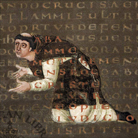
![]() CAROLIN
ESSER
CAROLIN
ESSER
| CURRICULUM VITAE |
| CURRENT RESEARCH |
| ABSTRACTS: |
| I am the Door |
| Better to Reign in Hell than Serve in Heaven |
| Naming the Divine |
| Thesis Abstract |
| APOCALYPTIC THEORIES |
 |
Better to Reign in Hell than Serve in Heaven: Satan's Realm as Inverted Hierarchy
International Congress on Medieval Studies, Kalamazoo (May 2004)
Juliana's tempting devil, finally confessing his true cause, calls his master 'min fæder', 'hellwarena cyning', 'egesful ealdor' and 'synna fruma'. These epithets for Satan do not seem very exceptional at first glance as the underlying concepts are well-known. What is striking is the correspondence of the central terms of these epithets for the devil with common designations for the Christian God in Old English Poetry. Through this parallel terminology the master of Juliana's tempter is literally presented as a mirror image of God. Like God, Satan is also a father, king, authority and creator. This horizontally reflected image however is then vertically inverted, and the qualifying by-words of Satan's epithets show that his image is negative to its extreme.
Juliana's devil does not merely present a warped imitation of divine hierarchy. He rather expresses a divinely ordered cosmological structure that places Satan, the ruler of hell, as God's counterpart at the hierarchical and moral opposite. Similar to the human king in middle-earth, Satan emulates God in the position he takes within his own realm.
The human king presides over a small-scale simile of the divine hierarchy and, intrinsically neutral, functions as an axis of symmetry between the two extremes. Satan is master on the negative scale. As head of hell, he occupies the lowest position in the overall structure and presents the exact opposite to God. The complete model is therefore also an expression of absolute morality. God, the ultimate good, is highest, while Satan falls lower than all other angels. Within hell, however, morality is also turned into the negative which allows Satan to believe in his own innocence, as expressed in Genesis B. We have here an instance of what C.S. Lewis called the 'lowarchy' in form of the Corpus Diaboli, itself a counterweight to the Corpus Christi.